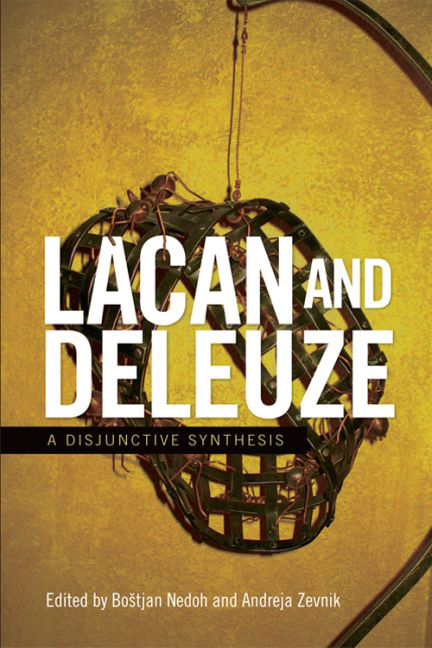Book contents
- Frontmatter
- Contents
- Acknowledgements
- Introduction: On a Disjunctive Synthesis between Lacan and Deleuze
- 1 For Another Lacan-Deleuze Encounter
- 2 Reciprocal Portrait of Jacques Lacan in Gilles Deleuze
- 3 Does the Body without Organs Have Any Sex at All? Lacan and Deleuze on Perversion and Sexual Difference
- 4 Gnomonology: Deleuze's Phobias and the Line of Flight between Speech and the Body
- 5 Lacan, Deleuze and the Politics of the Face
- 6 Denkwunderkeiten: On Deleuze, Schreber and Freud
- 7 Snark, Jabberwock, Poord'jeli: Deleuze and the Lacanian School on the Names-of-the-Father
- 8 Baroque Structuralism: Deleuze, Lacan and the Critique of Linguistics
- 9 Exalted Obscenity and the Lawyer of God: Lacan, Deleuze and the Baroque
- 10 The Death Drive
- 11 Repetition and Difference: Žižek, Deleuze and Lacanian Drives
- 12 Lacan, Deleuze and the Consequences of Formalism
- Notes on Contributors
- Index
1 - For Another Lacan-Deleuze Encounter
Published online by Cambridge University Press: 20 April 2017
- Frontmatter
- Contents
- Acknowledgements
- Introduction: On a Disjunctive Synthesis between Lacan and Deleuze
- 1 For Another Lacan-Deleuze Encounter
- 2 Reciprocal Portrait of Jacques Lacan in Gilles Deleuze
- 3 Does the Body without Organs Have Any Sex at All? Lacan and Deleuze on Perversion and Sexual Difference
- 4 Gnomonology: Deleuze's Phobias and the Line of Flight between Speech and the Body
- 5 Lacan, Deleuze and the Politics of the Face
- 6 Denkwunderkeiten: On Deleuze, Schreber and Freud
- 7 Snark, Jabberwock, Poord'jeli: Deleuze and the Lacanian School on the Names-of-the-Father
- 8 Baroque Structuralism: Deleuze, Lacan and the Critique of Linguistics
- 9 Exalted Obscenity and the Lawyer of God: Lacan, Deleuze and the Baroque
- 10 The Death Drive
- 11 Repetition and Difference: Žižek, Deleuze and Lacanian Drives
- 12 Lacan, Deleuze and the Consequences of Formalism
- Notes on Contributors
- Index
Summary
How does one encounter something or someone? What happens? What is the logic of encounter as such? What if the ‘Lacan–Deleuze encounter’ is all about these questions? What if the questions regarding the nature and logics of an encounter are intrinsically bound with the theoretical/practical projects and central notions of Deleuze and Lacan, if there are any: the event (philosophy) in the former and the unconscious (psychoanalysis) in the latter? For Lacan (and to a certain degree for Deleuze, too) an encounter is necessary and unavoidable for a human being: an encounter with language and speech. For Lacan, the human being is a speaking being, whereas for him the unconscious is nothing but the ‘effects of speech on the subject’. One could say then that for Lacan an encounter is necessary, whereas how one deals with it is always singular and contingent (or how one encounters one's own image in the mirror, the Other, one's own sexuality, desire, fantasy, drive, jouissance, one's own symptoms and unconscious, objet petit a, psychoanalysis, transference, partner, love, etc.). However, if Lacan were to claim only that, he would be a nominalist claiming that there are only individual encounters and only differences. For him there is also logic here, the logic of a certain deadlock, which has its own inner limits, inconsistencies and antagonisms, which Lacan calls the real, the real as impossible. It is here at the point where things by definition do not work out that Lacan meets Deleuze and it is here that another Lacan–Deleuze encounter and, more generally, another encounter between philosophy and psychoanalysis is on the agenda today. This is a vast topic, though, and we will limit ourselves here to only its basic outline.
There is a general consensus that the encounter between Deleuze and Lacan turned out badly. It would be interesting to delve more deeply into the details, but due to the lack of space we will limit ourselves to a couple of remarks. It is well known that there was a brief period of proximity between Deleuze and Lacan in the years 1967–9, but with Guattari entering the picture things first changed and then came to a close with the publication of Anti-Oedipus in 1972.
- Type
- Chapter
- Information
- Lacan and DeleuzeA Disjunctive Synthesis, pp. 13 - 31Publisher: Edinburgh University PressPrint publication year: 2017



